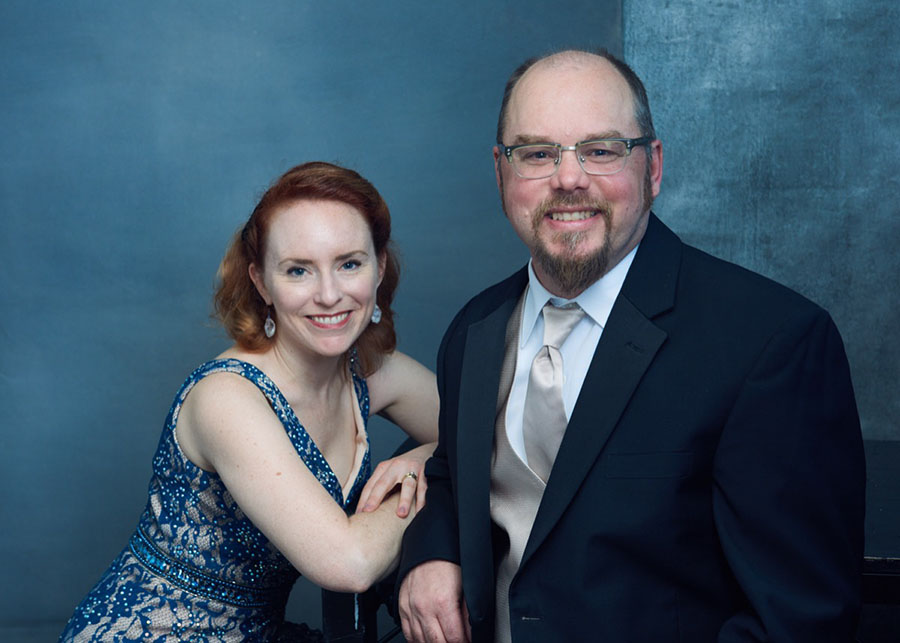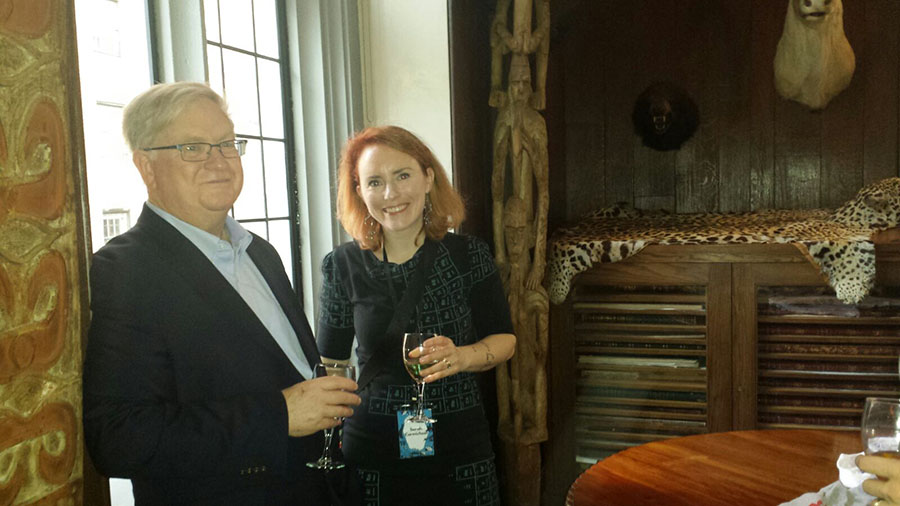
Dr. Sarah Carmichael, associate professor in the Department of Geology at Appalachian State University, is shown with her husband, Tom Hansell, documentary filmmaker in the Center for Appalachian Studies, in the Ellis Island Immigration Museum for the 113th Explorers Club Annual Dinner. Carmichael was recently received as a Fellow in The Explorers Club. Photo by Felix Kunze
BOONE, N.C.—Sarah Carmichael, associate professor in Appalachian State University’s Department of Geology, was received as a Fellow in The Explorers Club, headquartered in New York City, on March 24. Fellows in the society include distinguished persons who have contributed to scientific knowledge through exploration or outstanding field work, such as astronauts John Glenn, Neil Armstrong and Sally Ride, polar explorers and mountaineers Robert Peary, Roald Amundsen, Sir Edmund Hillary and Tenzing Norgay, ocean explorers Don Walsh, Thor Heyerdahl, Sylvia Earle and Bob Ballard, and anthropologists Jane Goodall, Lewis and Richard Leaky, Donald Johanson and Dian Fossey, among others.
The honor is a result of Carmichael’s research in challenging environments across the globe. She has carried out research in a submersible at the bottom of the ocean, studied mass extinctions in western China and western Mongolia, applied her expertise to understanding the formation of ancient footprints in volcanic ash in Tanzania, and studied the formation of manganese oxide minerals in caves of Appalachia with an eye to practical application.
Originally from Newmarket, New Hampshire, Carmichael received her doctorate in earth and planetary sciences from John Hopkins University in 2006, where she researched how water coming from ancient hydrothermal vents changed the chemistry of the surrounding rocks. This water passes through hot rock on its journey through the sea floor, and Carmichael studied changes in both the water and the rock as both are affected through chemical processes. Later that year during her postdoctoral research, she had the opportunity to descend to the ocean floor in Alvin, a research submersible in order to study modern hydrothermal vents — and was almost caught in a dangerous underwater avalanche while doing so.
Due to her interdisciplinary geochemistry background, Carmichael was able to initiate a variety of research collaborations that have taken her to a variety of interesting places. She has studied evidence of mass extinctions in western China and western Mongolia (as part of an international team of geoscientists including Dr. Johnny Waters, professor emeritus of geology at Appalachian and also a Fellow of the Explorers Club). These places were only islands in an ocean at the time of the extinctions, yet they provide ancient ocean chemical signatures, which in turn hold clues about underlying causes of the massive loss of life. The research is fascinating, and there are practical reasons for it.
“As the mass extinctions were likely due to rapid changes in climate, our work can be used to make predictions about rapidly changing climates in the future due to anthropogenic climate change,” Carmichael said. “Furthermore, this series of mass extinctions is the source of much of the organic carbon preserved both as shale gas and conventional oil deposits around the globe, and our research on how these deposits formed may have broad geopolitical ramifications if it’s found that these understudied areas could host significant reserves of natural gas.”
Carmichael’s research has also taken her to Tanzania with Dr. Cynthia Liutkus-Pierce, professor of geology at Appalachian, where her expertise in minerology has been applied to an understanding of the cementation associated with more than 400 human footprints left in ash from a volcanic eruption millennia ago.
Carmichael is also collaborating in research with Dr. Suzanna Bräuer, microbiologist and faculty member in Appalachian’s Department of Biology, in the caves of southern Appalachia in northeastern Tennessee and southwest Virginia. Minerology and microbiology intersect in their work. Microbrial secretions on rock can dissolve the rock, which in turn provides nutrients for microbes. Due to the ability of bacteria and fungi to make sponge-like manganese oxide minerals that filter heavy metals from water, Carmichael and Bräuer saw the possibility of a practical application for their research: inexpensive water filtration systems.
According to The Explorers Club web site, the organization was founded in May 1904 as “an organization to unite explorers in the bonds of good fellowship and to promote the work of exploration by every means in its power.” The organization offers grants for explorations around the globe and continues to recognize intrepid explorers, who have obtained significant knowledge in difficult conditions.
The Explorers Club, said Carmichael, “represents a community that recognizes the value of putting yourself in physically difficult/challenging situations not for thrill-seeking or fame but for advancing scientific knowledge. People don’t always appreciate the importance of field observations and fieldwork; not all systems can be duplicated under laboratory conditions or through computer models.”
Carmichael was inspired to apply to become a Fellow in The Explorers Club when she visited the society several years ago. She accompanied one of her students, Cameron Batchelor ’15, who was giving a talk at The Explorer’s Club 2015 Annual Meeting. Batchelor had received a grant the year before from the Explorers Club Youth Activity Fund that made it possible for her to go with Carmichael and Waters to study mass extinctions in Mongolia, and she had been invited to talk about her experience at The Explorers Club Annual Meeting.
While there, Carmichael was inspired by a photo of Sally Ride on The Explorers Club wall of Fellows//Medalists. “I thought I should do this too, and make 6-year-old me proud – I had idolized Sally Ride when I was 6,” Carmichael said.
There was another reason Carmichael chose to go apply to be a Fellow. “Since the Explorers Club did not allow women as members until 1981, I also decided to become a Fellow in order to pay tribute to the women scientists who came before me, and to try to normalize the presence of women in extreme fieldwork, exploration and scientific discovery for the women who will come after me,” she said.
Carmichael said of her work and of The Explorers Club to which she was inducted, “I’m rarely in a lab while silently mixing chemicals. It’s far more common to see me in waders or a cave helmet, weighed down with sampling gear and absolutely covered in mud or dirt. The Explorers Club is a place where that kind of scientific inquiry is appreciated.”
Speaking about Appalachian’s Department of Geology and the resources available from The Explorers Club for funding student fieldwork, Carmichael stated, “What’s wonderful about being part of Appalachian’s geology department is that I’m not an anomaly in my love of extreme science and fieldwork. The geology department at Appalachian has faculty who have done fieldwork on every continent (including Antarctica), from the tops of mountains to the bottom of the ocean and everywhere in between. We like to take our students with us into the field, but getting them out to these remote locations is extremely expensive. The Explorers Club is a fantastic resource for student travel funding, and The Explorers Club network is valuable for developing collaborations that offer alternative sources of fieldwork funding besides federal grants, which are extremely competitive.”
About the Department of Geology
Located in Western North Carolina, Appalachian State University provides the perfect setting to study geology. The Department of Geology provides students with a solid foundation on which to build a successful career in the geosciences. The department offers both a B.A. and B.S. degree, with the option of concentrations in environmental geology, quantitative geoscience, paleontology and secondary education. Most students go into environmental consulting, mining, oil/gas or secondary education teaching (earth sciences or natural sciences), or enter graduate school.
About Appalachian State University
As a premier public institution, Appalachian State University prepares students to lead purposeful lives. App State is one of 17 campuses in the University of North Carolina System, with a national reputation for innovative teaching and opening access to a high-quality, cost-effective education. The university enrolls more than 21,000 students, has a low student-to-faculty ratio and offers more than 150 undergraduate and 80 graduate majors at its Boone and Hickory campuses and through App State Online. Learn more at https://www.appstate.edu.
What do you think?
Share your feedback on this story.





![How NCInnovation Is Rethinking Economic Development in North Carolina [faculty featured]](/_images/_posts/2026/02/rethinking-economic-development-600x400.jpg)






